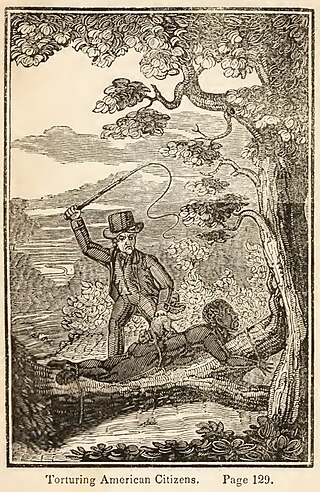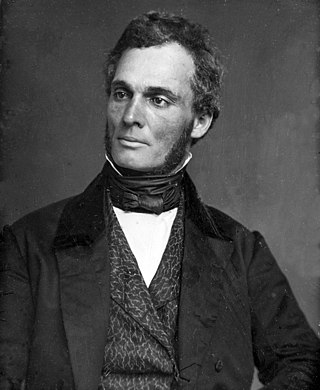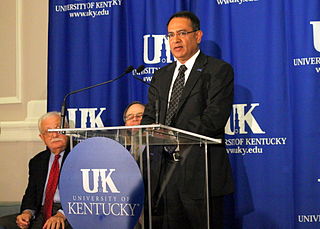
The University of Massachusetts Amherst is a public land-grant research university in Amherst, Massachusetts. It is the flagship campus of the University of Massachusetts system, and was founded in 1863 as the Massachusetts Agricultural College. It is also a member of the Five College Consortium, along with four other colleges in the Pioneer Valley.

The legal institution of human chattel slavery, comprising the enslavement primarily of Africans and African Americans, was prevalent in the United States of America from its founding in 1776 until 1865, predominantly in the South. Slavery was established throughout European colonization in the Americas. From 1526, during the early colonial period, it was practiced in what became Britain's colonies, including the Thirteen Colonies that formed the United States. Under the law, an enslaved person was treated as property that could be bought, sold, or given away. Slavery lasted in about half of U.S. states until abolition in 1865, and issues concerning slavery seeped into every aspect of national politics, economics, and social custom. In the decades after the end of Reconstruction in 1877, many of slavery's economic and social functions were continued through segregation, sharecropping, and convict leasing.

Robert Purvis was an American abolitionist in the United States. He was born in Charleston, South Carolina, and was likely educated at Amherst Academy, a secondary school in Amherst, Massachusetts. He spent most of his life in Philadelphia, Pennsylvania. In 1833 he helped found the American Anti-Slavery Society and the Library Company of Colored People. From 1845 to 1850 he served as president of the Pennsylvania Anti-Slavery Society and also traveled to Britain to gain support for the movement.

Sarah Parker Remond was an American lecturer, activist and abolitionist campaigner.

Johnnetta Betsch Cole is an American anthropologist, educator, museum director, and college president. Cole was the first female African-American president of Spelman College, a historically black college, serving from 1987 to 1997. She was president of Bennett College from 2002 to 2007. During 2009–2017 she was Director of the Smithsonian Institution's National Museum of African Art. Cole served as the national chair and 7th president for the National Council of Negro Women from 2018 to 2022.
Black Indians are Native American people – defined as Native American due to being affiliated with Native American communities and being culturally Native American – who also have significant African American heritage.

David William Blight is the Sterling Professor of History, of African American Studies, and of American Studies and Director of the Gilder Lehrman Center for the Study of Slavery, Resistance, and Abolition at Yale University. Previously, Blight was a professor of History at Amherst College, where he taught for 13 years. He has won several awards, including the Bancroft Prize and Frederick Douglass Prize for Race and Reunion: The Civil War in American Memory, and the Pulitzer Prize and Lincoln Prize for Frederick Douglass: Prophet of Freedom. In 2021, he was elected to the American Philosophical Society.

The Choctaw freedmen are former enslaved African Americans who were emancipated and granted citizenship in the Choctaw Nation after the Civil War, according to the tribe's new peace treaty with the United States. The term also applies to their contemporary descendants.

The African slave trade was first brought to Alabama when the region was part of the French Louisiana Colony.

Gwendolyn Midlo Hall was an American historian who focused on the history of slavery in the Caribbean, Latin America, Louisiana, Africa, and the African Diaspora in the Americas. Discovering extensive French and Spanish colonial documents related to the slave trade in Louisiana, she wrote Africans in Colonial Louisiana: The Development of Afro-Creole Culture in the Eighteenth Century (1992), studied the ethnic origins of enslaved Africans brought to Louisiana, as well as the process of creolization, which created new cultures. She changed the way in which several related disciplines are researched and taught, adding to scholarly understanding of the diverse origins of cultures throughout the Americas.
Brian Kelly is an American historian and a lecturer in US history, teaching at Queen's University Belfast in Northern Ireland. His work is concerned mainly with labor and race in the American South, although much of his most recent scholarship focuses on the formative struggles around slave emancipation during the American Civil War and the Reconstruction Era that followed.

Kumble R. Subbaswamy is a physicist and college administrator who served as the 11th chancellor of the University of Massachusetts Amherst. He currently serves as Interim Senior Vice President for Academic and Student Affairs and Equity, serving the five-campus University of Massachusetts system. He formerly served as the provost of University of Kentucky.
Michael Blakey is an American anthropologist who specializes in physical anthropology and its connection to the history of African Americans. Since 2001, he has been a National Endowment for the Humanities professor at the College of William & Mary, where he directs the Institute for Historical Biology. Previously, he was a professor at Howard University and the curator of Howard University's Montague Cobb Biological Anthropology Laboratory.

The College of Humanities & Fine Arts is a college of the University of Massachusetts Amherst. The college was founded in 1915.

Gladys-Marie Fry was Professor Emerita of Folklore and English at the University of Maryland, College Park, Maryland, and a leading authority on African American textiles. Fry earned her bachelor's and master's degrees from Howard University and her Ph.D. from Indiana University. She is the author of Stitched From the Soul: Slave Quilting in the Ante-Bellum South and Night Riders in Black Folk History. A contributor or author to 8 museum catalogs, Fry is also the author of a number of articles and book chapters. Fry has also served as the curator for 11 museum exhibitions and consultant to exhibits and television programs around the nation.

James Keith Motley is a former academic administrator who served as the eighth chancellor of the University of Massachusetts Boston.
Gretchen Holbrook Gerzina is an American author and academic who has written mostly historically-grounded biographical studies. Her academic posts have included being the Kathe Tappe Vernon Professor of Biography at Dartmouth College, working as a professor at Vassar College, being a professor and a director of Africana Studies at Barnard College, and as at April 2019 being the Dean of the University of Massachusetts Amherst Commonwealth Honors College. Gerzina was the host of WAMC's nationally-syndicated radio program The Book Show for fourteen years, where she interviewed authors.

Indigenous peoples of the Americas slave ownership refers to the ownership of enslaved people by indigenous peoples of the Americas from the colonial period to the abolition of slavery. Indigenous people enslaved Amerindians, Africans, and —occasionally— Europeans.
Martha S. Jones is an American historian and legal scholar. She is the Society of Black Alumni Presidential Professor and Professor of History at The Johns Hopkins University. She studies the legal and cultural history of the United States, with a particular focus on how Black Americans have shaped the history of American democracy. She has published books on the voting rights of African American women, the debates about women's rights among Black Americans in the early United States, and the development of birthright citizenship in the United States as promoted by African Americans in Baltimore before the Civil War.

The history of slavery in Oklahoma began in the 1830s with the five Native American nations in the area: Cherokee, Chickasaw, Choctaw, Creek, and Seminole. Slavery within these Native American nations began simply by placing a lower status on them than their master. The slavery in these tribes varied in style, being specifically different from American slavery. Slavery in the area continued to grow for many years, even throughout the entirety of the Civil War. The growth was significant, slaves making up a portion of the population in the new Indian territory. Slavery ended in the Oklahoma area with the completion of the Civil War. Treaties were made with the nations regarding citizenship and slavery for African Americans. The repercussions of slavery that followed greatly affected the state, with prominent racial issues.















